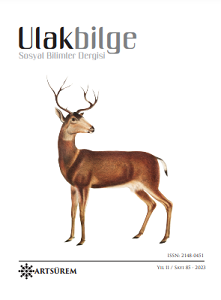GÖRSEL SANATLAR ÖĞRETMENİ ADAYLARININ SANAL ORTAMDAKİ MESLEKÎ DENEYİMLERİ
PROFESSIONAL EXPERIENCES OF PRE-SERVICE VISUAL ARTS TEACHERS IN VIRTUAL ENVIRONMENT
Author(s): Sevgi KayalioğluSubject(s): Education, Visual Arts, Health and medicine and law, Distance learning / e-learning, Pedagogy
Published by: Sanat ve Dil Araştırmaları Enstitüsü
Keywords: Teaching practice; visual arts; art education; distance education; covid-19; coronavirus;
Summary/Abstract: Due to the crisis created by the coronavirus epidemic, activities within the scope of teacher training continued through distance education in Turkey as in much of the world. The purpose of the current study is to reveal the advantageous and disadvantageous aspects of the ‘Teaching Practice 1’ course conducted through distance education in the field of visual arts education, its contributions to the professional experience of the participants, and expectations regarding the course. The participants of the study, which is a case study, consisted of 40 preservice teachers studying in the visual arts teaching department of three different state universities in Turkey. The data of the study were collected with a semi-structured interview form and analyzed with an inductive approach, and the MAXQDA 20.4.0 package program was used at this stage. At the end of the study, it was concluded that some of the problems encountered in the distance education process are similar to the problems experienced in face-to-face education. Moreover, the pre-service visual arts teachers described teaching practice activities conducted through distance education as a “unique experience”; they developed a belief that the technology-based infrastructure in distance education will contribute to their professional experiences in the future. Situations such as distance education providing virtual teaching experience and increasing digital competence due to the integrated nature of the courses with technology are seen among the strengths of the teaching practice course. Despite its advantages, the decrease in the number of students participating in the lessons, the virtual environment’s inability to represent the real classroom atmosphere, communication and interaction problems between the pre-service teachers and students were found to be the weaknesses of the process. Developing software tools that allow for teaching experiences like virtual classroom simulations and conducting a portion of micro-teaching activities in these environments can be given as suggestions.
Journal: Ulakbilge Sosyal Bilimler Dergisi
- Issue Year: 11/2023
- Issue No: 85
- Page Range: 494-507
- Page Count: 14
- Language: Turkish

